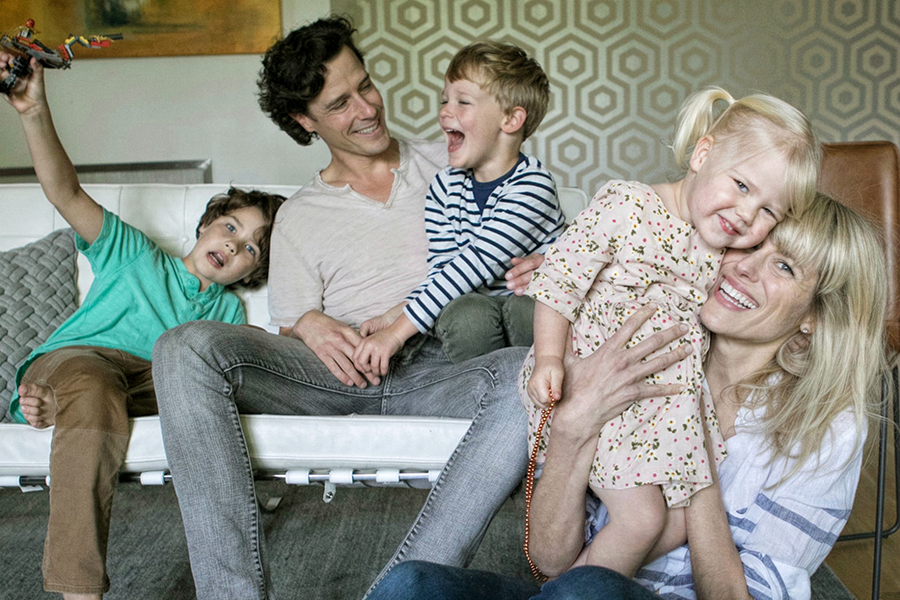Entrepreneurs often have a “lightbulb moment,” a sudden realization or insight that drives a business idea into reality. But, for Jessica Rolph, cofounder and CEO of early childhood brand, Lovevery (above, right), her moment of inspiration came as a new mother in what was almost an “anti-lightbulb” moment.
“I remember one morning watching my son pull himself up to this toy and push one button, and suddenly lightbulbs are flashing, a purple cow is popping out, and all of this stuff was happening,” she says. “I asked myself, ‘what was this toy really doing for my connection with my child and his brain development?’”
Rolph threw herself into a search for answers, reading a doctoral thesis on infant brain development, making her own toys, and talking to experts, researchers, and specialists. And in 2017, Rolph and cofounder and Lovevery President Roderick Morris put those answers to work. The pair launched Boise-based Lovevery, a maker of stage-based play essentials for children and multi-channel content for parents.
The brand has grown rapidly since, with a unique subscription-based business model that supports parents and children throughout the developmental stages of early childhood. It has generated a subscription Annual Recurring Revenue exceeding $90 million. Lovevery’s high-profile fan base includes multi-hyphenates Jessica Alba and Ayesha Curry, models Ashley Graham and Gigi Hadid, and Olympian Allyson Felix. Google Ventures and Chan Zuckerberg are among its investors. Through rapid growth and the COVID-19 pandemic, Lovevery has stayed focused on “helping parents feel confident they are giving their children the very best start in life,” says Rolph. “There’s always purpose in work, and for Lovevery, our purpose” is to be a support system for families.
I spoke with Rolph on a recent summer day as she juggled multiple calls and meetings — a skill honed from nearly 20 years in the entrepreneurial trenches. Here are four takeaways from that conversation:
The Power of Co-creation
A serial entrepreneur, Rolph has cofounded three organizations — Happy Family in 2003 with Shazi Visram; the Climate Collaborative in 2017 with four co-founders; and Lovevery with Morris. “The co-creation process is important to me,” she says. “In my experience, that deep trusting partnership is where so much brilliance can be created. It takes more than one person to build out a vision” for a company.
Three Pillars of Impact
As a builder of businesses with purpose, Rolph grounds decisions on triple-bottom-line factors. At Lovevery, sustainability and climate have fundamentally shaped how products are made. Sustainably harvested wood, organic materials, and recyclable packaging “are table stakes.” And to extend the life of their products, the company also offers a spare parts guarantee, so a lost puzzle piece or missing peg doesn’t mean something becomes landfill. “We want to keep our products in use for as many babies as possible.”
Lovevery is also focused on expanding initiatives around equity and inclusion and education and access so that all families can experience the transformational benefits of Lovevery’s early learning resources.
Fundraise with Purpose
Lovevery’s “A-List” of investors reflects fundraising skills honed from launching multiple companies, as well as a subscription-based business model that has exceptionally high retention rates and addresses early childhood development. Investor interest is also grounded in a sense of shared purpose. “I think there’s a meaning and a purpose around the backers we have,” she says. “Chan Zuckerberg and Reach Capital want to impact early childhood development. Google wants to help shape the future, and children are our future. And Maevron wants to work with disruptors and innovators who are values-based, so I think that is why we’ve been able to connect with them.”
Lovevery also benefited from another source—investors who use philanthropic dollars to make investments, including the ImpactAssets donor advised fund. “They’re some of the most mission-aligned investors we have,” says Rolph. She and her husband, Decker, are also clients of ImpactAssets and have made similar investments in firms. “These are the kinds of investors we want to bring in as we scale. We want to feel like we are all in it together, that there is real respect for what we’re trying to accomplish.”
Research to Reinvent Play
From its beginning, Lovevery has been a research-based company, digging into data and scientific reports rather than just designing eye candy for babies, toddlers, and parents. “Research defines everything we do,” she says. “We’ve deconstructed this notion that a toy has to look a certain way — have flashing lights or be cozy and cute — and think of them as tools for learning. We want to be that link between the research around child development and the parents.”
Rolph’s long-term vision for Lovevery transcends toy making. “We are building a platform for parents to connect with experts around speech development, occupational therapy, and emotional, social development. We want to be a go-to resource for early childhood development research and thereby improve outcomes for all children.”




































